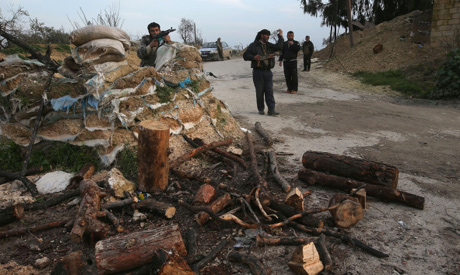
Free Syrian Army fighters stand guard on their checkpoint, at the main entrance of the Christian village of Yacobiyeh, in Idlib province,Thursday, 21 February 2013 (Photo: AP)
Bushra, whose house was destroyed and who had to sell her jewellery to flee war-ravaged Syria to neighbouring Lebanon, has become, much to her chagrin, the one millionth UN refugee.
She and her little boy and girl now live with her in-laws and relatives in a 20-square-metre (215-square-foot) house in a poor neighbourhood in Lebanon's northern port city of Tripoli.
Bushra knows nothing of her husband, Mohammed, who stayed behind when she and the children fled to her parents in a Damascus suburb a year ago.
She, Hanine, aged 4, and Sultan, 2, arrived in Lebanon two weeks ago.
"I had to sell everything to be able to get out," she said. I paid 10,500 Syrian pounds ($105) to pay for a taxi that brought us to Lebanon."
On Wednesday, the 19-year-old mother went to the offices of the UN High Commissioner for Refugees (UNHCR) to register -- and learned that she was officially the one millionth person to do so.
That same day, UNHCR chief Antonio Guterres had announced in Geneva that there were "a million people in flight, millions more displaced internally and thousands of people continuing to cross the border every day."
He described Syria, where the two-year-old war has left the economy in tatters and where basic needs are increasingly hard to come by, as "spiralling towards full-scale disaster."
"That means that one million Syrians are going through the same thing I am," Bushra said tearfully as she sat on an old blanket on the floor.
"That figure should sensitise the world to the plight of Syrian refugees so that they help us more," she added without showing much confidence that this would be the case.
Bushra recalls her flight from Homs in February 2012 after much hesitation, and then in panic.
"I was among the last to leave Homs. We were scared when we heard that the shabiha (militia loyal to President Bashar al-Assad) were entering Homs and raping women.
Mohammed, a 30-year-old taxi driver, chose to stay behind to "guard the house."
"On March 1, 2012 we tried in vain to contact him. And since then, we have no news of him."
Bushra said with bitterness that her most heartfelt desire was to find out what happened to the man she fell in love with as a young teenager and married in 2008.
In Tripoli it is tough, living in a cramped, damp home that costs $250 a month to rent. All in all it houses more than 20 people -- her in-laws and their three other sons and the families of their four daughters.
"My children were terrified by the bombing. I tried to reassure them by telling them we would go to Lebanon to their grandparents," she said.
Sultan, stretched out on a mattress, is coughing. His mother says he has been suffering from acute respiratory problems because of the humidity in the house.
And Hanine, born with malformations of the mouth and nose, needs surgery.
But Bushra has no money, and the UNHCR's only aid, a monthly ration of food, has not yet arrived.
Reflecting on the number one million, she said: "For me, it's the number of misfortune because it testifies to a difficult situation.
"If nothing changes, I will have to go back to Syria. Living in exile is humiliating."
Short link: